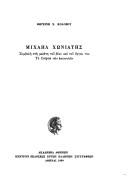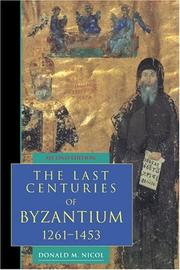| Listing 1 - 10 of 27 | << page >> |
Sort by
|
Book
ISBN: 0860781909 9780860781905 Year: 1986 Volume: 242 Publisher: London Variorum Reprints
Abstract | Keywords | Export | Availability | Bookmark
 Loading...
Loading...Choose an application
- Reference Manager
- EndNote
- RefWorks (Direct export to RefWorks)
Byzantine Empire --- Prosopography --- History --- -Prosopography --- -Methodology --- -Byzantine Empire --- Methodology --- Byzantine Empire - History - 1081-1453
Book
ISBN: 9780754659327 0754659321 Year: 2007 Volume: 882 Publisher: Aldershot Burlington Ashgate
Abstract | Keywords | Export | Availability | Bookmark
 Loading...
Loading...Choose an application
- Reference Manager
- EndNote
- RefWorks (Direct export to RefWorks)
Turkey --- Byzantine Empire --- History --- Turkey - History - 1288-1453 --- Turkey - History - 1453-1683 --- Byzantine Empire - History - 1081-1453
Book
ISBN: 9780190253226 0190253223 9780190253240 019025324X Year: 2017 Publisher: New York, NY : Oxford University Press,
Abstract | Keywords | Export | Availability | Bookmark
 Loading...
Loading...Choose an application
- Reference Manager
- EndNote
- RefWorks (Direct export to RefWorks)
In the second half of the tenth century, Byzantium embarked on a series of spectacular conquests, first in the southeast against the Arabs, then in Bulgaria, and finally in the Georgian and Armenian lands. By the early eleventh century, the empire was the most powerful state in the Mediterranean. It was also expanding economically, demographically, and, in time, intellectually as well. Yet this imperial project came to a crashing collapse fifty years later when political disunity, fiscal mismanagement, and defeat at the hands of the Seljuks in the east and the Normans in the west not only spelled the end of Byzantium's historical dominance of southern Italy, the Balkans, Caucasus, and northern Mesopotamia, but also threatened its very survival. Streams of Gold, Rivers of Blood offers new interpretations of key topics relevant to Medieval history. The narrative is in 3 parts: the first covers the years 955-1025, a period of imperial conquest and consolidation of authority under the emperor Basil. The second (1025-1059) examines the dispersal of centralized authority in Constantinople as well as the emergence of new foreign enemies (Pechenegs, Seljuks, Normans). The last section chronicles the spectacular collapse of the empire during the second half of the eleventh century, concluding with a look at the First Crusade and its consequences for Byzantine relations with the powers of Western Europe.
Byzantine Empire --- History --- 527-1453. --- Byzantine Empire. --- 527-1453 --- Byzance --- Byzantine Empire - History - 527-1081 --- Byzantine Empire - History - 1081-1453
Book
ISBN: 9780521832311 0521832314 Year: 2008 Publisher: Cambridge, UK ; New York : Cambridge University Press,
Abstract | Keywords | Export | Availability | Bookmark
 Loading...
Loading...Choose an application
- Reference Manager
- EndNote
- RefWorks (Direct export to RefWorks)
Byzantium lasted a thousand years, ruled to the end by self-styled 'emperors of the Romans'. It underwent kaleidoscopic territorial and structural changes, yet recovered repeatedly from disaster: even after the near-impregnable Constantinople fell in 1204, variant forms of the empire reconstituted themselves. The Cambridge History of the Byzantine Empire tells the story, tracing political and military events, religious controversies and economic change. It offers clear, authoritative chapters on the main events and periods, with more detailed chapters on particular outlying regions, neighbouring powers or aspects of Byzantium. With aids such as a glossary, an alternative place-name table and references to English translations of sources, it will be valuable as an introduction. However, it also offers stimulating new approaches and important new findings, making it essential reading for postgraduates and for specialists.
Byzantine Empire --- Empire byzantin --- History --- Histoire --- --Byzance --- --Byzantine Empire --- Byzance --- Byzantine Empire - History - 527-1081 --- Byzantine Empire - History - 1081-1453 --- 527-1081 --- 1081-1453
Book
ISBN: 081350659X 9780813506593 Year: 1970 Publisher: New Brunswick Rutgers university press
Abstract | Keywords | Export | Availability | Bookmark
 Loading...
Loading...Choose an application
- Reference Manager
- EndNote
- RefWorks (Direct export to RefWorks)
Greece --- Byzantine Empire --- History --- Civilization --- Greece, Medieval --- Medieval Greece --- Civilization. --- Greece - History - 323-1453 --- Byzantine Empire - History - 1081-1453 --- Greece - Civilization
Book
ISBN: 9780674599185 9780674599192 0674599187 0674599195 Year: 2014 Volume: 33, 34 Publisher: Cambridge (Mass.) : Harvard university press,
Abstract | Keywords | Export | Availability | Bookmark
 Loading...
Loading...Choose an application
- Reference Manager
- EndNote
- RefWorks (Direct export to RefWorks)
"Among Greek histories of the fall of Constantinople in 1453, the work of Laonikos (ca. 1430-ca. 1465) has by far the broadest scope. Born to a leading family of Athens under Florentine rule, he was educated in the classics at Mistra by the Neoplatonist philosopher Plethon. In the 1450s, Laonikos set out to imitate Herodotos in writing the history of his times, a version in which the armies of Asia would prevail over the Greeks in Europe. The backbone of the Histories, a text written in difficult Thucydidean Greek, is the expansion of the Ottoman Empire from the early 1300s to 1464, but Laonikos's digressions give sweeping accounts of world geography and ethnography from Britain to Mongolia, with an emphasis on Spain, Italy, and Arabia. Following the methodology of Herodotos and rejecting theological polemic, Laonikos is the first Greek writer to treat Islam as a legitimate cultural and religious system. He followed Plethon in viewing the Byzantines as Greeks rather than Romans, and so stands at the origins of Neo-Hellenic identity. This translation makes the entire text of The Histories available in English for the first time."--Publisher description.
Byzantine Empire --- Turkey --- Istanbul (Turkey) --- Greece --- History --- Siege of Istanbul (Turkey : 1453) --- Greece, Medieval --- Medieval Greece --- Siege, 1453 --- Venice (Italy) --- Byzantine Empire - History - 1081-1453 --- Turkey - History - 1288-1453 --- Istanbul (Turkey) - History - Siege, 1453 --- Greece - History - 323-1453

ISBN: 9607099826 9789607099822 Year: 1999 Volume: 2 Publisher: Athine Akadimia Athinon
Abstract | Keywords | Export | Availability | Bookmark
 Loading...
Loading...Choose an application
- Reference Manager
- EndNote
- RefWorks (Direct export to RefWorks)
Choniates, Michael, --- Orthodox Eastern Church --- Bishops --- Byzantine Empire --- History --- Acominatus, Michael Choniates, --- Akominatos, Michael Choniates, --- Michael, --- Choniates, Michael, - 1138-ca. 1222. - Correspondence --- Choniates, Michael, - 1138-ca. 1222 --- Byzantine Empire - History - 1081-1453

ISBN: 0521439914 0521433843 9780521439916 Year: 1993 Publisher: Cambridge Cambridge University press
Abstract | Keywords | Export | Availability | Bookmark
 Loading...
Loading...Choose an application
- Reference Manager
- EndNote
- RefWorks (Direct export to RefWorks)
Book
ISBN: 9789004499706 9789004460928 9004460926 9004499709 Year: 2022 Publisher: Leiden; Boston : BRILL
Abstract | Keywords | Export | Availability | Bookmark
 Loading...
Loading...Choose an application
- Reference Manager
- EndNote
- RefWorks (Direct export to RefWorks)
Samuel P. Müller offers here the first book-length study of the image of Latins in Byzantine historiography of the long twelfth century, a crucial period that witnessed an unprecedented intensification of Byzantine-Western relations. He notably argues against popular assertions that the image of Latins is "negative" and reflective of steadily mounting tension. Instead, Müller shows that Byzantine historiography can hardly be taken as evidence that the conquest of 1204 was the inevitable outcome of previous interactions. The representation of Latins is complex, ambivalent, and reflective of fickle and multifaceted Byzantine-Western relations. The book also highlights the need to focus on Byzantine identities and crucial, introspective motivations to which the image of Latins is subordinated.
Byzantine Empire --- Romans - Byzantine Empire. --- Romans - Ethnic identity. --- National characteristics, Roman. --- Byzantine Empire - History - 1081-1453 - Historiography. --- Byzantine Empire - Foreign relations - 1081-1453. --- Byzantine Empire - Civilization - Roman influences. --- Romans
Book
Abstract | Keywords | Export | Availability | Bookmark
 Loading...
Loading...Choose an application
- Reference Manager
- EndNote
- RefWorks (Direct export to RefWorks)
History of Greece --- anno 1200-1499 --- Byzantine Empire --- History --- 949.5.04 --- -Geschiedenis van Byzantium: Griekse en Latijnse staten--(1204-1453) --- -Byzantine Empire --- -949.5.04 --- -949.5.04 Geschiedenis van Byzantium: Griekse en Latijnse staten--(1204-1453) --- Geschiedenis van Byzantium: Griekse en Latijnse staten--(1204-1453) --- 949.5.04 Geschiedenis van Byzantium: Griekse en Latijnse staten--(1204-1453) --- Byzantine Empire - History - 1081-1453
| Listing 1 - 10 of 27 | << page >> |
Sort by
|

 Search
Search Feedback
Feedback About UniCat
About UniCat  Help
Help News
News